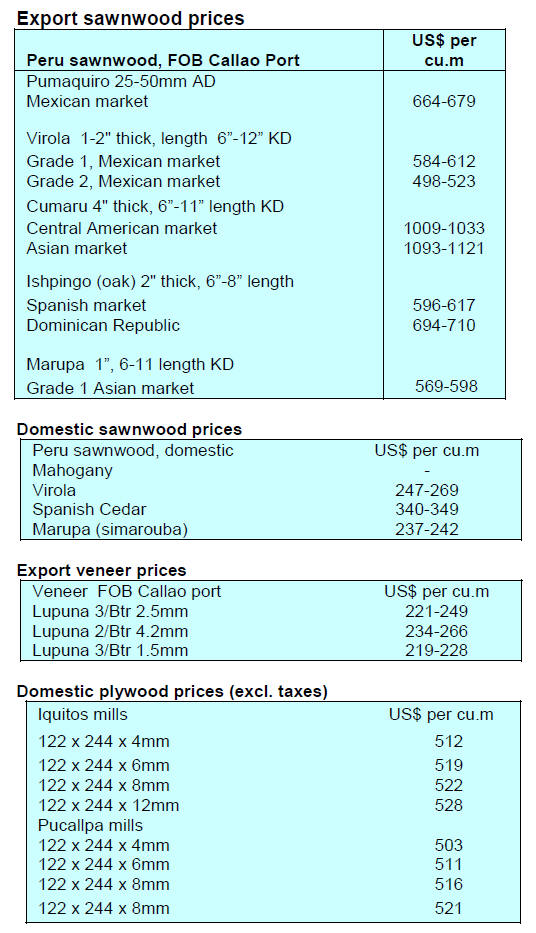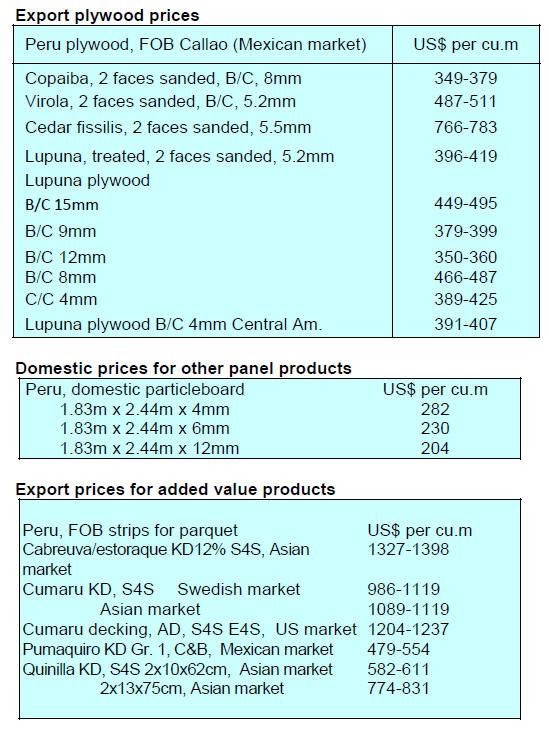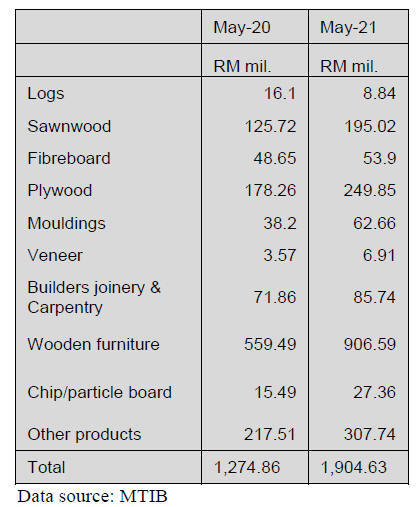
4.
INDONESIA
Indonesian Ambassador visits UK
timber companies
In a bid to encourage UK timber importers to increase
their purchase of wood products from Indonesia a
delegation from the Embassy in the UK led by Indonesian
Ambassador, Desra Percaya, recently visited a number of
timber companies in the country.
During the visits the Ambassador said there is an
opportunity to gain from the UK-Indonesia FLEGT-VPA
and ensure that high-quality timbers remain firmly
established in UK industry’s supply chain.
See:
http://www.ttjonline.com/news/indonesian-ambassadorvisits-uk-timber-companies-8908227
Green Deal and Fit for 55 climate package
The European Union Ambassador to Indonesia, Vincent
Piket, in speaking with the press explained the European
Green Deal and the Fit for 55 Climate package.
In July this year the European Commission adopted a
package of proposals to make the EU's climate, energy,
land use, transport and taxation policies fit for reducing
net greenhouse gas emissions by at least 55% by 2030,
compared to 1990 levels.
Achieving these emission reductions in the next decade is
crucial to Europe becoming the world's first climateneutral
continent by 2050 and making the European Green
Deal a reality.
The Commission presented the legislative tools to deliver
on the targets agreed in the European Climate Law and
fundamentally transform the economy and society for a
fair, green and prosperous future.
The Ambassador said this would not affect trade with
Indonesia or the Comprehensive Economic Partnership
Agreement (CEPA) free trade negotiations with Indonesia.
But mentioned it is possible that there will be additional
regulations to prevent the entry into the EU of products
that damage the environment.
See:
https://ec.europa.eu/commission/presscorner/detail/en/IP_21_3541
Indonesian ‘Suar’ furniture a hit in Canada
The Indonesian Consul General in Toronto, Leonard F.
Hutabarat, was present at the inauguration of a showroom
featuring Indonesian wooden furniture especially suar
wood (also known as trembesi wood).
Suar wood is the Indonesian variety of Albizia saman, a
tree native to South America. It was introduced to
Indonesia in the mid 19th century by the Portuguese as a
plantation tree. Fast growing tree by nature, it has spread
throughout the region and is used for wood slab furniture.
The Canadian importers and showroom owner said that
Indonesia has abundant suar wood and skilled workers to
manufacture quality products. According to his assessment
suar wood furniture is in demand in Canada and the
United States.
See:
https://kemlu.go.id/toronto/id/news/14764/dorong-eksporfurniture-kayu-suar-indonesia-ke-kanada-konjen-ri-torontoresmikan-heft-home-showroom-toronto
In related news Indonesian teak products find a ready
market in Germany according to Indonesian Ambassador
to Germany, Arif Havas Oegroseno.
Products from Indonesia teak plantations are subject to the
Indonesia Timber Legality Verification System (SLVK)
recognised by the European Union.
The teak, which is produced sustainably, legally and
socially responsibly has advantages over teak from other
Southeast Asian countries, which in recent years is thought
to have suffered a reputational decline due to allegations
of over exploitation of forest land and environmental
damage due to land clearing for teak plantations said
Oegroseno.
He also pointed out that the commitment of Indonesia to
the FLEGT control system is expected to satisfy European
Union consumers that Indonesian wood products are
produced legally.
See:
https://radarsukabumi.com/dunia/kayu-jati-indonesia-jadisorotan-dunia-paling-dicari-di-jerman/
Reaction to negative NGO campaigns targeting SFM
A Member of Commission IV of the House of
Representatives, Firman Subagyo has said negative
campaigns by a number of environmental NGOs targeting
the Indonesian forestry sector could harm national
economic interests. He cited a case where pressure from
international NGOs resulted in an Indonesian company
losing its FSC certified status. Subagyo called on the
government to be firm with NGOss that interfere with
national economic interests.
See:
https://www.suara.com/bisnis/2021/07/16/142605/pemerintahdiminta-tindak-lsm-yang-halangi-ekspor-produk-alamri?page=all
Transparency in carbon projects
Indonesian Environment and Forestry Minister, Siti
Nurbaya, says efforts to trace collaboration among a
number of carbon projects in which local governments are
engaged are aimed at ensuring that the national
greenhouse gas inventory remains transparent and
credible. Local governments are legally required to report
the greenhouse gas inventory in each of their territories to
the Minister in her capacity as the country’s national focal
point to the UNFCCC.
The Minister stressed that local governments engaged in
carbon projects are obliged to immediately report to her as
well as to the Minister of Home Affairs primarily on the
legal basis for their engagement with carbon projects in
their territories.
In addition, Minister Nurbaya pointed out that the local
governments engaged in carbon projects are also to report
on policy measures taken, the extent of the management
area, the scope of activities, methodologies and the targets.
See:
https://foresthints.news/minister-tracing-local-govt-carbonprojects-to-keep-indonesias-ndc-target-on-track/
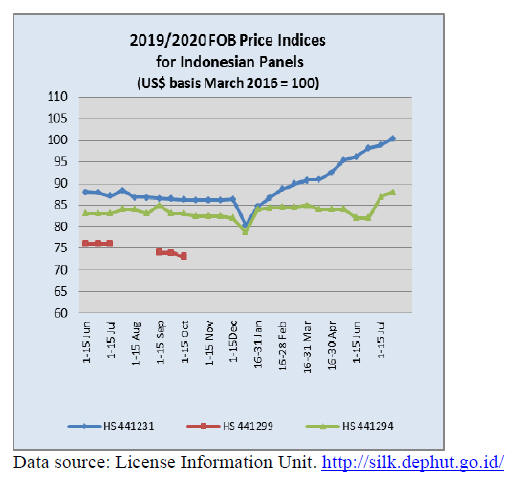
5.
MYANMAR
Exports of wood products suspended
The government procedures for monitoring exports of
wood products were suspended by Forest Department after
the government announced the closure of government
departments from in response to the recent surge in corona
infections across the country. The result of this action is
that timber exports are stalled. The Myanma Timber
Enterprise has not resumed the tender sale of logs.
The Myanmar Port Authority (MPA) issued a statement
saying port operations will continue handling incoming
international shipments.
See:
https://elevenmyanmar.com/news/yangon-internationaljetties-remain-operative-during-public-holidays
Covid-19 third wave
The number of fatalities in the third wave of coronavirus
has exceeded the combined total of Covid-19 deaths in the
first two waves of the pandemic according to the Ministry
of Health and Sports (MOHS).
A total of 3,216 people died in the first and second waves
between March last year and late May this year. Since
then, there have been 3,921 fatalities in less than two
months. The MOHS figures are widely-believed to be an
underestimate as they exclude people who died of Covid-
19 at home.
See:
https://www.irrawaddy.com/news/burma/myanmars-thirdwave-covid-19-deaths-now-exceed-fatalities-in-first-and-secondwaves.html
Heavy job losses since February coup
The International Labor Organization (ILO) has estimated
Myanmar lost 1.2 million jobs in the second quarter 2021
following the February military coup that crippled an
economy already weakened by the coronavirus pandemic.
Donglin Li, the ILO’s representative for Myanmar said in
a statement “Myanmar was already facing economic stress
with jobs and livelihoods under threat as a result of the
COVID-19 pandemic. However, the estimates show a
serious and rapid deterioration in employment in the first
half of this year on a scale that could drive many in
Myanmar into deep poverty.”
The ILO statement continued, “the political crisis has
exacerbated the severe impacts of COVID-19 and has
extensively destabilised the economy and halted an
expected economic recovery”.
The employment trends during the first half of 2021
indicated “considerable losses in both employment and
working hours,” with women estimated to have been
impacted more than men.
See:
http://www.ilo.org/global/about-theilo/newsroom/news/WCMS_814686/lang--en/index.htm
Political turmoil and third wave of COVID-19 severely
impacting the economy
Mariam Sherman, World Bank Country Director for
Myanmar, Cambodia and Lao PDR said in a statement
“The loss of jobs and income and heightened health and
food security risks are compounding the welfare
challenges faced by the poorest and most vulnerable,
including those that were already hit hardest by the
pandemic last year,”
The statement continues “Myanmar’s ongoing political
turmoil and a rapidly-rising third wave of COVID-19
cases are severely impacting an economy that had already
been weakened by the pandemic in 2020.
The economy is expected to contract around 18% in
Myanmar’s 2021 Fiscal Year (October 2020 to September
2021) with damaging implications for lives, livelihoods,
poverty and future growth, according to the latest World
Bank’s Myanmar Economic Monitor. An 18%
contraction, coming on top of weak growth in FY2020,
would mean that the country’s economy is
around 30 percent smaller than it would have been in the
absence of COVID-19 and the military takeover of
February 2021”.
See:
https://www.worldbank.org/en/news/pressrelease/2021/07/23/myanmar-economy-expected-to-contract-by-18-percent-in-fy2021-report
Desperate need for action - UN
In a statement, Tom Andrews, Special Rapporteur on the
human rights situation in Myanmar and Mary
Lawlor, Special Rapporteur on human rights
defenders, highlighted credible reports from Myanmar of
activists forced into hiding after having arrests warrants
issued against them under Section 505 (a) of the Penal
Code. The author say homes of activists were raided,
possessions seized and family members threatened and
harassed noting that many others who were unable to flee
have been arrested.
Lawyers representing those detained after the coup have
themselves been detained, as have journalists covering the
protests, the statement added.
Special Rapporteur Andrews said that the people of
Myanmar appreciate the expressions of concern from the
international community, “but what they desperately need
is action”.
See:
https://news.un.org/en/story/2021/07/1096072
6. INDIA
Inflation heats up
The Ministry of Commerce and Industry has reported the
official Wholesale Price Index (WPI) for ‘All
Commodities’ (Base: 2011-12=100) for June increased to
133.5 from 132.7 in May 2021.
The annual rate of inflation, based on the monthly WPI
was, year on year, 12.07% in June 2021. The higher rate of
inflation in June was primarily due to effect of a low year
on year base prices.
The index for manufactured products accounts for 64% of
the index increased. Out of the 22 groups of manufactured
products tracked 11 groups saw price increases with 8
seeing declines. The balance remained unchanged. Price
increases were recorded for wood and of products of wood
and cork but a price decline was reported for veneers.
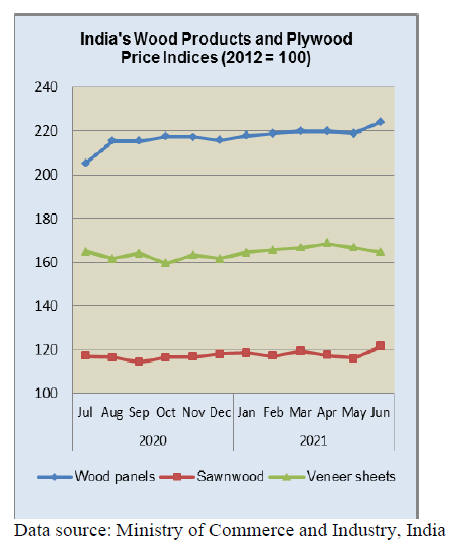
The press release from the Ministry of Commerce and
Industry
can be found at:
http://eaindustry.nic.in/cmonthly.pdf
Home sales remain sluggish
Home sales in the second quarter (April to June 2021) fell
sharply as potential buyers delayed investments. Sales in
Delhi NCR, Mumbai, Bangalore and Pune were especially
badly hit.
Overall, sales were down over 50% compared to the
previous quarter and it was in the Tier II and III cities that
the steepest declines were seen.
However, enquiries from potential buyers improved in
June as the rate of corona infections dropped allowing
some lock-down measures to be lifted. Analysts anticipate
a higher rate of sales in the 3 months after June supported
by stable interest rates and subsidies on stamp duty and
registration charges.
Building companies have been kept afloat during the
pandemic by government initiatives in loan restructuring
and tax rebates. This support has helped builders complete
ongoing projects but with an unsold housing stock and
weak demand house prices are under pressure.
See:
https://www.financialexpress.com/money/housing-sales-intop-8-metro-cities-fall-by-55-as-60000-units-sold-in-april-june-2021/2289978/
Plantation teak prices C&F Indian ports
Surging freight charges are resulting in higher landed costs
for teak shipments.
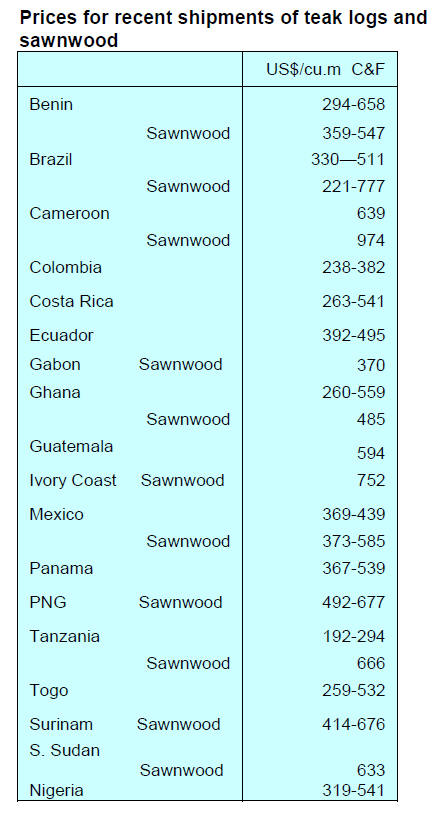
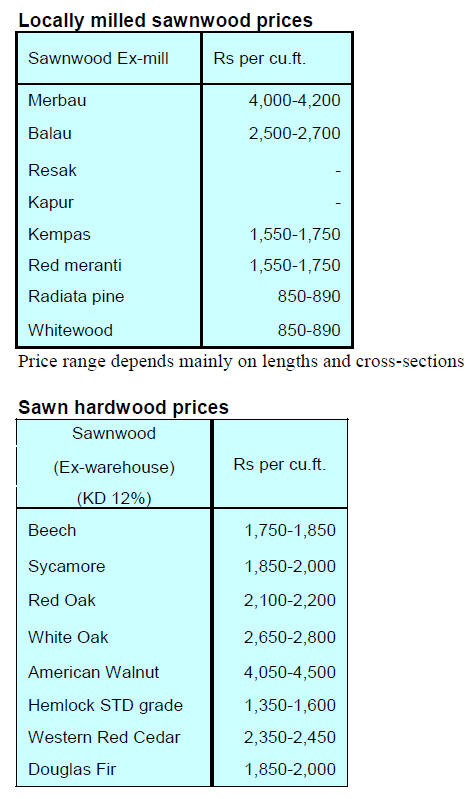
Plywood
Log availability is becoming an issue for manufacturers
and rising log costs are eating into the bottom-line of
plywood manufacturers. As the housing market is still
fairly active plywood producers will be seeking an
opportunity to raise prices.
In a press release reported in the Times Of India Century
Plyboards has said it has launched a ‘Century Promise
app’ which will provide customers with the means to
determine if they are buying genuine Century products or
fake labelled plywood. The company says this will be
achieved through an embedded QR code.
The plywood market in the country is worth over Rs
23,000 crore (US$3 mil. plus) and around 30% of this is
from the ‘organised’ sector including Century Plyboard.
The other 70% of plywood available is from smaller
producers and where counterfeit plywood is sold to
unsuspecting consumers.
See:
https://timesofindia.indiatimes.com/business/indiabusiness/century-ply-eyes-pre-covid-level-biz-injuly/articleshow/84565782.cms
Current plywood prices are reported below.
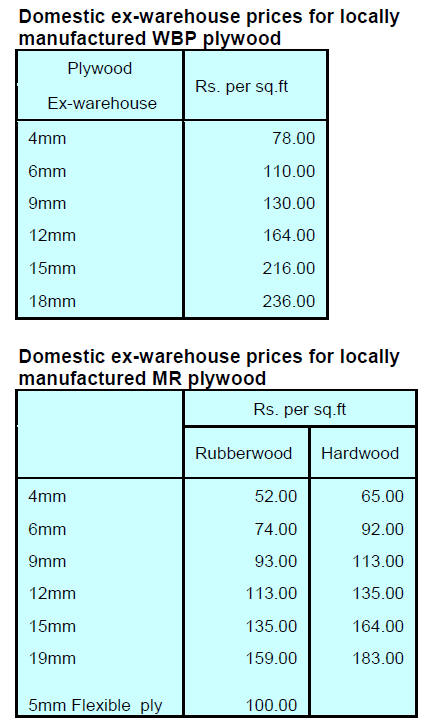
Tree planting festival
Every year in the first week of July a week-long
celebration, Van Mahotsav, is observed. One event is the
planting of tree saplings and the Union Environment
Minister, Prakash Javadekar, urged people to plant more
and more trees to create a healthy environment.
Van Mahotsav, was first launced by a botanist who
organised the first Indian national tree plantation week in
1947. In 1950, the plantation drive was declared as a
national activity by the then Minister of Food and
Agriculture Kanaiyalal Maneklal Munshi. Later in the
same year, Munshi moved the event to the first week of
July and renamed it Van Mahotsav.
Deforestation in the country has led to a 16% loss in forest
cover over the last decade and Van Mahotsav plays a
crucial role in raising public awareness.
See:
https://www.indiatoday.in/information/story/van-mahotsav-2021-history-significance-celebrations-and-everything-you-needto-know-1821532-2021-07-01
7.
VIETNAM
Southern Vietnam under lockdown
The entire Suthern Region of Vietnam has been placed
under a two-week lockdown as confirmed Covid-19 cases
exceeded 3,000 daily at the end of July. The lockdown
order includes the Mekong Delta and Ho Chi Minh City
metropolis the country’s financial and economic hub (a
third of Vietnam’s population).
The timber industry had been doing well until mid-July
but the infection situation has become much worse.
Many companies tried to accommodate workers on-site in
order to keep factories running but this was not successful.
The likelihood is that that many factories will soon have to
close. Infections rates are rising steeply in Binh Duong,
Dong Nai and Ho Chi Minh City, localities contributing
70% of total exports.
Punitive tariffs avoided
The Office of the US Trade Representative has said it had
determined that no tariff action against Vietnam was
warranted after its Central Bank agreed with the US
Treasury not to manipulate its currency for an export
advantage.
The statement reads: “The Office of the United States
Trade Representative today issued a formal determination
in the Vietnam Currency Section 301 investigation
reflecting the agreement reached earlier this week between
the Department of the Treasury and the State Bank of
Vietnam.
The determination finds that the Treasury-SBV agreement
provides a satisfactory resolution of the matter subject to
investigation and accordingly that no trade action is
warranted at this time. USTR, in coordination with
Treasury, will monitor Vietnam’s implementation going
forward.
See:
https://ustr.gov/sites/default/files/files/Press/Releases/Vietnam_Currency_301_Notice_FRN.pdf
Earlier this year the business community in the US urged
the Trade Office not to resort to tariffs as a remedy in its
trade disputes with Vietnam.
Brazil, the largest supplier of eucalypts to Vietnam
In June 2021 Vietnam's eucalypts imports were estimated
at 25,200 cu.m. worth US$5.0 million, down 0.8% in
volume and 0.4% in value compared to May 2021.
However, compared to June 2020 imports were 3 times
higher. In the first 6 months of 2021 imports of wood of
this species reached 137,800 cu.m. worth US$29.2
million, up 99% in volume and 96% in value over the
same period in 2020.
Eucalypt import from all sources in the first 5 months of
this year accounted for around 58% of total timber imports
by volume.
Brazil topped the list of eucalypt suppliers by shippingto
Vietnam 39,700 cu.m worth US$10.6 million, up 58% in
volume and 52% in value over the same period in 2020.
Value of eucalypts imports 2019 - 2021
According to Vietnam’s General Department of Customs,
Vietnam's eucalypts imports in the first 5 months of 2021
eucalypts imports reached 112,600 cu.mworth US$24.2
million, up 77% in volume and 75% in value over the
same period in 2020.
Eucalypts products
In the first 5 months of 2021 imports of eucalypts logs
reached 79,100 cu.m worth US$13 million, up 80% in
volume and 86% in value over the same period in 2020.
Imports of eucalypts sawnwood reached 33,253 cu.m,
worth US$11.1 million, up 753% in volume and 68% in
value over the same period in 2020.
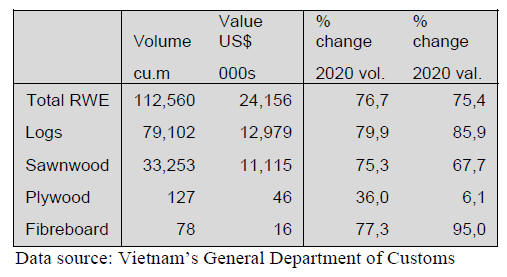
Prices for imported eucalyptus
In the first 5 months of 2021 the average price of imported
eucalypts US$214.6/cu.m, down 0.7% over the same
period in 2020.
In particular, the price of imports from Brazil was
US$268/cu.m, down 3.6% over the same period in 2020;
from South Africa US 171.4/cu.m, down 2.5%; from
Australia US$ 280/cu.m, down 4.0 per cent.
In contrast, the price of this wood from Uruguay reached
US 192.9/m³, up 8.0% over the same period in 2020 and
prices of eucalyptus from Papua New Guinea averaged
US$161.4/cu.m, up 12%.
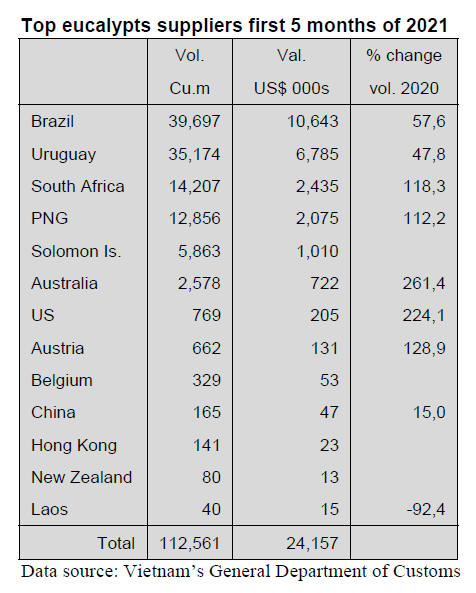
Imports Southeast Asia on rise
According to Vietnam’s General Department of Customs
imports of wood products Southeast Asian countries in
May 2021 reached 74,500 cu.m with a value of US$25.79
million, down 29% in volume and 21% in value compared
to April 2021 but up almost 100% in volume and 186% in
value over the same period in 2020.
In the first 5 months of 2021, imports of wood products
from Southeast Asia reached 452,200 cu.m valued at
US$135.65 million a year-on-year rise in volume and
value.
Key suppliers in SE Asia
In the first 5 months of 2021, imports of wood from
Thailand reached 280,550 cu.m with a value of US$63,75
million, up 79% in volume and 101% in value over the
same period in 2020.
Wood products imported from Thailand are mainly
fibreboard and particleboard, accounting for 98% of the
total imports. In the first 5 months of 2021, imports of
fibreboard from Thailand increased by 90% in volume and
107% in value over the same period in 2020 while imports
of particle-board increased by 50% in volume and 83% in
value.
In the first 5 months of 2021 imports of wood products
from Laos reached 64,5500 cu.m with a value of
US$38,42 million, up 85% in volume and 89% in value
over the same period in 2020.
Around 80% of the total wood products imported from
Laos in the first 5 months of 2021 was sawnwood and
totaled 53,7400 cu.m with a value of US$36,38 million, up
93% in volume and 88% in value over the same period in
2020.
In the first 5 months of 2021, imports of wood products
from Malaysia reached 55,3800 at a value of US$16,76
million, up 7.8% in volume and 35% in value over the
same period in 2020.
Particleboard remained the main imported wood product
from Malaysia in the first 5 months of 2021 reaching
34,070 cu.m with avalue of US$8,85 million, up 29,7% in
volume and 63,4% in value over the same period in 2020.
In the first 5 months of 2021 imports of logs from
Malaysia dropped byhalf in volume and by half in value.
On the other hand imports of sawnwood increased by
161% in volume and 10% in value, reaching 17,680 cu.m
with a value of US$6.93 million.
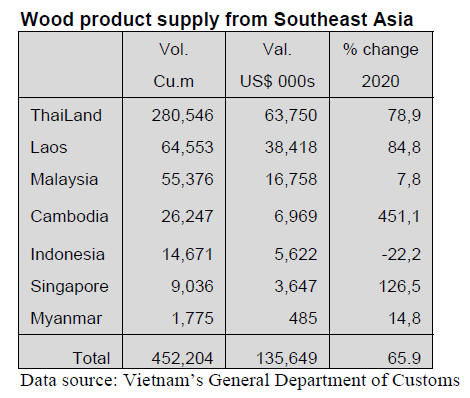
8. BRAZIL
Interest rate hike
In June 2021 the Central Bank of Brazil (BCB) increased
the basic interest rate (Selic) by 0.75% to 4.25% the third
consecutive monthly rate increase and is likely to raise it
by at least another 0.75% on 4 August.
Plans to vastly expand forest concessions
The Brazilian Federal Government wants to increase the
area of forest concessions granted to the private sector
from the current 1 million hectares to 4 million hectares by
the end of 2023. Nine public forest areas may be granted,
six in the Amazon and three in the Southern Region.
In 2020, the government collected R$28 million from
forest concession holders. The expectation for this year is
that revenue will rise to R$32 million.
Forest concessions are considered a priority by the
Ministry of Agriculture, Livestock and Food Supply
(MAPA) which has said the concession plan is in the
preparatory phase.
The Brazilian Forest Service has said forest concessions
usually attract small business owners from the region and
through the concession arrangement have legal security
which encourages investment.
See:
https://economia.uol.com.br/noticias/redacao/2021/07/17/governo-bolsonaro-concessoes-florestas-amazonia-meio-ambiente.htm
Lower interest rates for small businesses
The Committee on Economic Development, Industry,
Commerce and Services of the Chamber of Deputies
approved Draft Bill N° 3.605/20, which reduces the
interest rate charged to micro and small businesses during
the Covid-19 pandemic.
The Draft Bill also provides for different rates, terms and
modalities ensuring lower interest rates on loans from
official financial institutions with the aim of driving
economic recovery.
The Draft Bill requires recipients to maintain the level of
jobs and salaries and prohibits share buybacks; salary
increases, bonuses or additional benefits for its executives
and officers.
The Draft Bill will still be analysed by the Committees on
Finances and Taxation and the Constitution and Justice
and Citizenship. For the Brazilian forest sector the Ddraft
Bill is welcome as it would support small-sized
companies.
Export update
In June 2021 Brazilian exports of wood-based products
(except pulp and paper) increased 82% in value compared
to June 2020, from US$216.9 million to US$394.3
million.
Pine sawnwood exports grew 74% in value between June
2020 (US$38.4 million) and June 2021 (US$66.7 million).
In volume, exports increased 24% over the same period,
from 224,500 cu.m to 278,800 cu.m.
Tropical sawnwood exports increased 65% in volume,
from 24,200 cu.m in June 2020 to 40,000 cu.m in June
2021. In value, exports rose 53% from US$9.2 million to
US$14.1 million, over the same period.
Pine plywood exports saw an almost 300% surge in value
in June 2021 in comparison with June 2020, from US$34.8
million to US$136.9 million. In volume, exports increased
65% over the same period, from 145,800 cu.m to 239,800
cu.m.
As for tropical plywood, exports increased in volume
(36%) and in value (75%), from 3,900 cu.m (US$1.6
million) in June 2020 to 5,300 cu.m (US$2.8 million) in
June 2021.
As for wooden furniture, the export value increased from
US$38.0 million in June 2020 to US$62.4 million in June
2021, a 64% growth.
Acre – record trade surplus
Acre, one of the main timber producing States in Brazil
recorded trade surplus of US$27.1 million, exceeding by
57% the trade balance for the same period of 2020
according to the Ministry of Economy (ME).
Acre state exported US$4.5 million and imported
US$331,400 in June 2021 resulting in a trade balance of
US$4.2 million. The data show that both the value of
exports and imports in June 2021 was higher than in June
2020.
According to the ME, in the case of exports the increase
was 105%, from US$2.2 million to US$4.5 million on the
other hand imports rose 117%. Between January and June
forest products represented 51% of all products exported
by the state. The main export destinations were Peru
(24%) and the United States (12%).
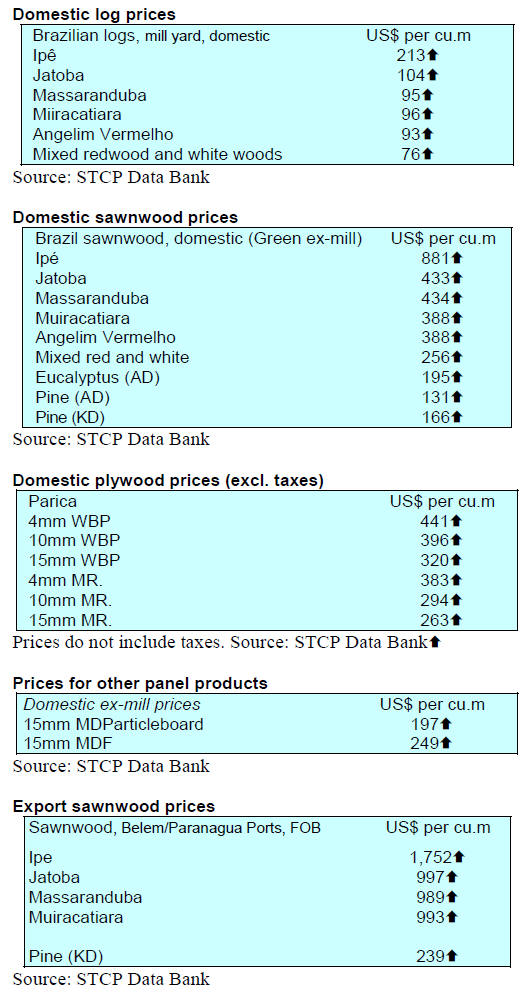
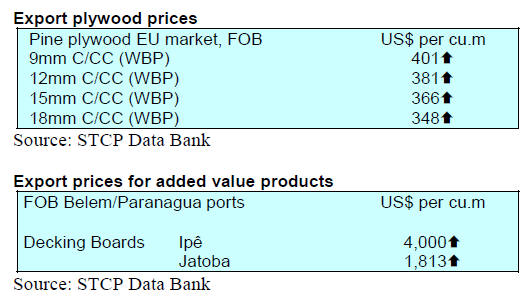
9. PERU
Preventing forest fires
The National Forest and Wildlife Service (SERFOR)
announced the start of its project: “Prevention and
response to forest fires in tropical forests and forest
plantations in Peru”, financed by the International Tropical
Timber Organization (ITTO).
It is common for more than 800 forest fires to be reported
annually in Peru with many going unreported. These fires
add to green house gases, destroy habitats and decimate
the biodiversity and smoke causes health problems for the
population.
The current project seeks to contribute to the conservation
of threatened forest ecosystems in the Cajamarca,
Huánuco, Junín, Pasco and Ucayali regions. To build the
capacity for prevention the project will strengthen
monitoring systems, create early warning systems and
improve response management.
During the launch of this initiative, the project director,
Elvira Gómez, highlighted ITTO's commitment to
supporting the fight against forest fires in Peru. For her
part, ITTO's Director of Operations, Sheam Satkura,
stressed that this collaboration will mark a milestone in
this area and pointed out that "together we can contribute
to the prevention and management of forest fires at an
international and national level."
Rising exports of wood products
According to the Association of Exporters (ADEX) semimanufactured
products exported in the period January to
May 2021 increased over 80% compared to the same
period in 2020. The main market for this sub-sector
continues to be China which accounted for over 40% of
the export business. Exports to China were almost 60%
year on year. The second most important market was
France with a 27% share of total export with Denmark
accounting for a 7% share.
Veneer and plywood exports increased of 46% year on
year with Mexico accounting for almost all of this trade.
January to May 2021 exports of furniture and parts
increased almost 60% year on year with the main markets
being the United States (64% share) followed by Italy
(15%) and Chile (14%).
Economic outlook encouraging
The Peru News Agency (Andina) has reported the nation's
economy is recovering with Economy-Finance Minister,
Waldo Mendoza, pointing out that after a 30% decline in
the second quarter of 2020 GDP also fell in the third (-9%)
and fourth (-1.7%) quarters of 202 due to the pandemic.
However, GDP rose by 3.8% in the first quarter of 2021
over the same period of 2020 and was slightly up on the
same period in 2019.
Mendoza also said outlook is encouraging with year on
year growth projection at around 10% for 2021, followed
by an average of 4.5% during 2022-2024.
See:
https://andina.pe/ingles/noticia-perus-economy-movingforward-how-it-reaches-the-bicentennial-854227.aspx
